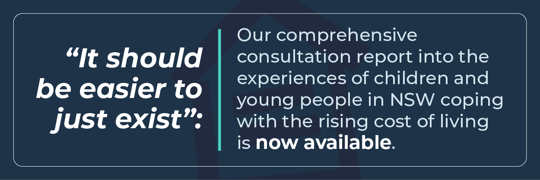
Media release - 10 December 2023

The NSW Advocate for Children and Young People, Zoë Robinson, has today released an extended report into the impacts of the rising cost of living on young people across NSW. Overall, more than 2,000 children and young people across NSW were engaged throughout the project, with the report finding that children and young people are struggling and being forced to choose between basic needs and rights such as food, shelter, education that impact on their futures.
“This report builds on interim findings released earlier this year and provides an important insight into the pressures that children, young people and their families are facing as a consequence of the rising cost of living. It gives us a real understanding of their current situations, their hopes for the future but also their real fears,” said Ms Robinson.
In ACYP’s 2023 polling, cost of living became the number one issue for children and young people aged 10 to 24 years in NSW for the first time, with over a third (35%) mentioning this issue unprompted – up from just 4% in 2021. It is also the top issue that young people would like to see more support from Government.
The report provides an important overview of the specific pressures that children, young people and their families are facing in the following areas: groceries, healthcare, housing, education, employment, transport, childcare and experiences of debt.
Across ACYP’s consultations, the key area that young people wanted government to focus their efforts on was housing. This referred to both supporting young people’s ability to buy their first home and reducing the cost of rent. ACYP’s polling also found that 76 per cent of young adults* reported that the proportion of income they spent on housing had increased in the past 12 months.
“We are all just pretending it’s okay to be living in a housing crisis,” said one young person, while another added that “moving back home isn’t an option for everyone.”
Other core priorities for young people included reducing the costs associated with education, cost of groceries, electricity and gas.
Ms Robinson stated that “this report highlights a confronting reality where children and young people are being forced to change their aspirations and sacrifice their health, wellbeing, education and social connections due rising cost of living.”
As one young person said, “I worry for my future as I know I might not be able to afford basic necessities let alone buying a house in the future. With my HECS debt being significantly indexed at the end of this financial year, I’m even more stressed about my debt and the fact that I will forever be paying off my HECS debt.”
Ms Robinson said, “The data reflects that this isn’t just “political noise” these are very real concerns for young people in NSW, and we need to ensure the policy settings that affect them, consider their voices and perspectives.
This report provides a series of important recommendations - for government, business and community - and highlights that further supports are needs to safeguard children and young people against the damaging impacts of the cost of living crisis.”
For more information or to arrange an interview with the Advocate for Children and Young People please contact: Anwen Ruttle on 0439 346 249 or Una O’Neill on 0491 224 049.
*The term ‘young adult’ is used when discussing data from ACYP’s 2023 Youth Week Survey to describe young people who are aged 18-24 years old and living independently.
Download |
P: 02 9248 0970
NSW Advocate for Children and Young People
Ground Floor, 219-241 Cleveland Street, Strawberry Hills NSW 2012
NSW Advocate for Children and Young People
Locked Bag 5000, PARRAMATTA NSW 2124
The Advocate for Children and Young People is under the DCJ ABN 36 433 875 185.
P: 02 9248 0943 or 0439 346 249
Receive updates and invitations from the Advocate
We acknowledge Aboriginal people as the First Nations Peoples of NSW and pay our respects to Elders past, present, and future.
Informed by lessons of the past, ACYP is improving how we work with Aboriginal people and communities. We listen and learn from the knowledge, strength and resilience of Stolen Generations Survivors, Aboriginal Elders and Aboriginal communities.